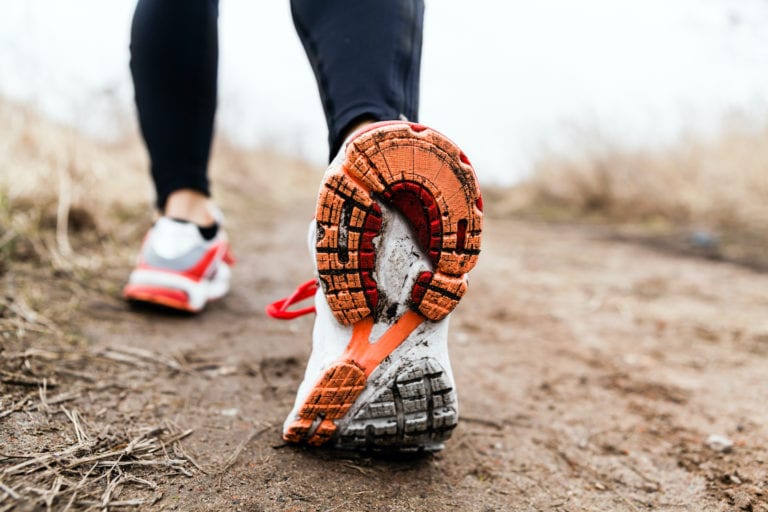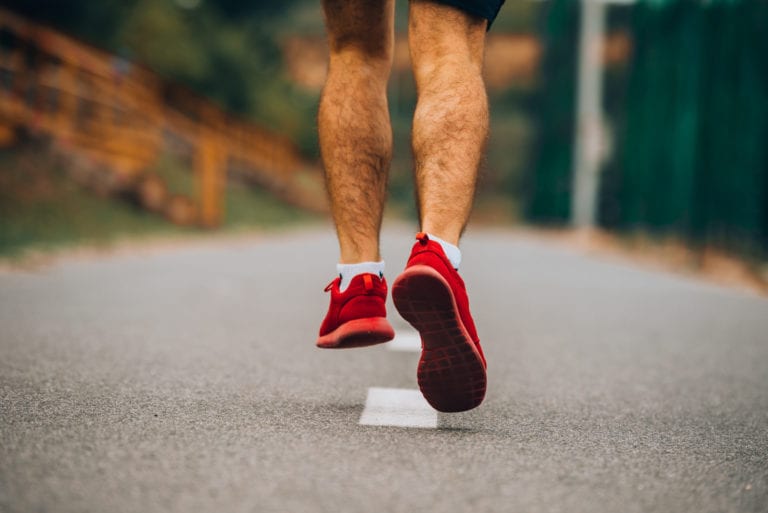If you’re not a morning person, waking up earlier than usual for a morning run can feel like torture. As you contemplate the idea, you should know morning runs have several benefits. Here’s a breakdown of what to expect and how to prepare for a morning run to yield the best results.
What are the advantages of running in the morning?
Running in the morning offers many health benefits extending beyond the physical. Below, we’ve listed some of the most compelling reasons why morning runs can be a game-changer in your daily routine:
- Improves race preparation: Most competitive races occur in the morning. Training at this time allows your body to perform under similar conditions. This includes adjusting to morning temperatures and learning to fuel your body appropriately for optimum early-day performance.
- Encourages self-care: When you commit to a morning run, it necessitates a certain level of self-care. This includes getting enough sleep the night before and fueling your body with nutritious foods. Running in the morning can foster a mindset of prioritizing self-care and encouraging healthier daily habits.

- Helps promote consistency and adherence: The early hours of the day are typically free from the interruptions that often derail evening workouts. Social commitments, late work hours, or simply feeling drained after a long day can all stand in the way of regular exercise. Morning runs circumvent these obstacles, providing a clear path to regular, uninterrupted aerobic exercise.
- Increases mental focus and productivity: Running releases endorphins (feel-good hormones). An early morning endorphin rush increases mental clarity and focus, setting a productive tone for the day ahead.
- Helps to improve sleep quality: Regular morning workouts can help regulate your body’s internal clock, the circadian rhythm leading to a higher quality of sleep. This rhythm influences your sleep-wake cycle, hormone release, and other bodily functions.
- May help manage blood pressure levels: Regular physical activity helps lower blood pressure by strengthening the heart, allowing it to pump more blood with less effort. Morning runs, in particular, have been shown to reduce blood pressure levels, offering a protective effect for the rest of the day.
- Can improve weight management: Running in the morning kick-starts your metabolism, leading to an increased calorie burn throughout the day. Combined with a balanced diet, this contributes to maintaining a healthy weight and preventing weight-related health issues.
How should I prepare for a morning run?
The right preparation ensures you get the most out of your workouts and makes the process more enjoyable and sustainable in the long term. Below are a few essential tips to help you prepare effectively for your morning runs:
- Prioritize sleep: Adequate rest is essential for physical activity. Aim for 7-9 hours of sleep a night. If you plan to wake up at 6 am for your run, go to bed between 9 and 11 pm.
- Prepare your gear ahead: To save precious morning minutes, lay out your running outfit, shoes, and gear like earbuds or a heart rate monitor the night before. This will make your morning routine smoother and more efficient.
- Stay hydrated: Rehydrate your body after a night’s sleep by drinking a glass of water before you head out on your run. Staying hydrated enhances performance and helps prevent muscle cramps.
- Don’t skip the warm-up: Warming up your body before any exercise is crucial to avoid injury. A good warm-up increases blood flow to your muscles and prepares your body for running. You could stop for several stretches or run slower for the first mile.

- Begin at a gentle pace: Just as your mind needs time to wake up, so does your body. Start your run leisurely, gradually increasing as your body warms up.
- Consider a running partner: Sharing your morning run with a friend can make the experience more enjoyable. It also provides a sense of safety, especially in the dark morning.
- Choose safe routes: Stick to well-lit, familiar paths for your morning runs, particularly when it’s still dark out. This ensures you’re aware of any potential obstacles and helps prevent accidents.
- Consistency is key: Consistency is the secret to a successful morning run routine. Make your morning run non-negotiable, and over time, it will become an integral part of your daily routine.
What should I drink before running in the morning?
Hydration is crucial for optimal performance during your morning run. Drink 16 ounces (2 cups) of water two hours before your run. You can pair it with a light snack or meal for energy. Fifteen minutes before you leave the house, have six to eight ounces of water.
Proper hydration plays a significant role in your running performance. Water lubricates your joints, regulates body temperature, and helps transport nutrients to cells for energy and stamina. Conversely, dehydration can lead to muscle cramps, dizziness, and fatigue, severely impacting your running performance and overall experience.
If you leave your house for a morning run at 6 am, following the above routine means you’ll wake up at 4 am to drink water and have a light snack. This can be challenging for most people. So instead, go to bed hydrated and keep your bedroom cool to avoid sweating too much. When you wake, drink a glass of water and have a light snack.
Note: Don’t forget to carry a water bottle to stay hydrated throughout the run.
Is it good to run on an empty stomach in the morning?
Eat a light meal before running to give your body the energy it requires for exercise. If you decide to run on an empty stomach, stick to light and moderate running, and if you start feeling dizzy or lightheaded, it’s crucial to stop and refuel.
The decision to run on an empty stomach depends on several factors, including your body’s response, the intensity of the run, and your overall health. The human body can handle light to moderate exercise in a fasted state, but for more intense or extended running sessions, having a meal before running is advisable to provide the necessary fuel for your muscles.
As for what to eat, opt for something light and easily digestible. This could be a banana, a slice of whole-grain toast with almond butter, or a small bowl of oatmeal. These foods provide a good mix of carbohydrates and protein without being too heavy. Everyone’s body responds differently to food before a workout, so it may take some trial and error to find what works best for you.
How many minutes should I run in the morning?
The duration of your morning run should be based on your fitness level, with an advisable range of 40 to 60 minutes at a low intensity if you’re running on an empty stomach. Your pace should be comfortable enough for easy conversation or a recovery run.
For beginners, even a 20-minute morning jog can be a great start. You can gradually increase your running time as your endurance and fitness improve. The suggested 40 to 60 minutes is a general guideline for those with a base fitness level.
Is it better to run at night or in the morning?
While running is beneficial at any time of day, morning runs may offer a slight advantage over running at night, particularly for weight loss goals, due to their potential to increase metabolism. However, the choice between morning and evening runs should align with your preference and schedule.

Morning running can help kick-start your metabolism, potentially leading to increased daily fat burn. A consistent morning exercise routine offers the advantage of starting your day on a high note, promoting mental clarity and productivity. Running in the morning helps establish an exercise routine as it faces less disruption from daily tasks than evening runs.
However, running in the evening has its own benefits. Some people find it a great way to wind down and release the day’s stress. Running in the evening can be just as beneficial if you’re not a morning person or your schedule doesn’t permit morning runs. Additionally, your body temperature and hormone levels peak in the evening, which may improve performance.
The most important factor is consistency. Choose a time that fits comfortably into your daily schedule that you can stick with in the long term.
How do I stay safe on morning runs?
Prioritizing safety is essential for running in the early morning hours when it is still dark. By taking precautionary measures, you can ensure your morning running routine is safe. Here are some tips to help you:
- Inform someone: It’s safe to let a family member, friend, or roommate know when and where you’re going for a run. This is particularly important during early morning runs when fewer people are around. Sharing your planned route and expected return time ensures that someone has a rough idea of your whereabouts, which can be vital in an emergency.
- Vary your route: Regularly changing your running route can serve a dual purpose. Firstly, providing new sights and challenges can make your runs more interesting. Secondly, it can enhance your safety by making your running habits less predictable. This can help deter anyone who might pose a threat.

- Adjust your pace: Being aware of your surroundings and adapting your pace accordingly is a smart move. Speed up if you’re in a less crowded or poorly lit area. Conversely, if you’re navigating a tricky terrain or a crowded path, slowing down can help avoid potential accidents.
- Avoid carrying mace: While carrying mace or pepper spray might initially seem like a good self-defense idea, it can pose risks. Accidental discharge can cause self-injury, plus carrying such items is against the law in some places. A personal alarm or whistle can be a safer alternative for attracting attention if you feel threatened.
- Run without music: While listening to music can make runs more enjoyable, it reduces your awareness of your surroundings. If you’re running in the dark or near traffic, hearing what’s happening around you is especially important. If you prefer to run with music, consider using bone-conducting headphones or only one earbud, so you can still hear ambient noise.
- Reflective gear is crucial: Early morning runs often mean less light, making it harder for motorists to see you. Wearing reflective clothing or accessories like a reflective vest, stripes on your shoes, or even a headlamp can significantly improve your visibility.
- Carry identification: Always carry some form of identification with you. In an accident or health issue, first responders can quickly identify you and notify your emergency contacts. Consider also including any important medical information, like allergies or chronic conditions.
Happy running
Running is more than just a form of physical exercise. It’s a journey that cultivates discipline, resilience, and a stronger connection with oneself.
By recognizing the benefits of running in the morning, adequately preparing, and prioritizing safety, you equip yourself with the tools to navigate this journey successfully. Whether you’re seeking improved health, tranquility, or a new challenge, the path of the morning runner welcomes you.


























